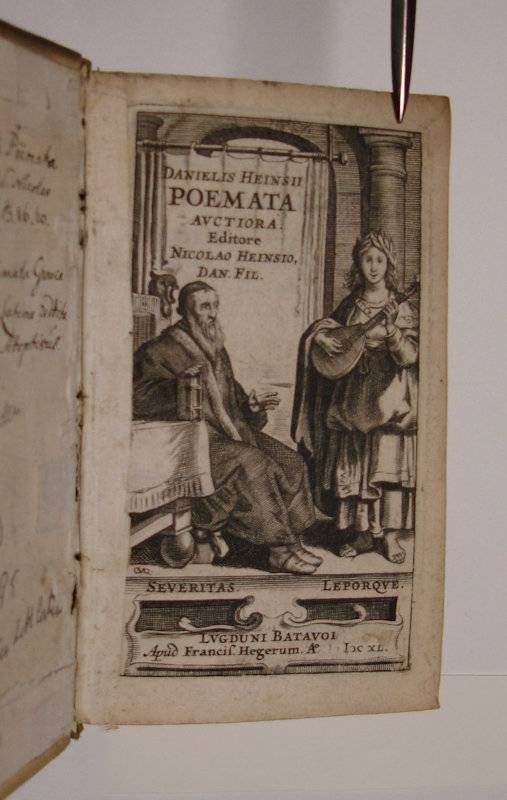HEINSIUS,D.
Danielis Heinsii Poemata auctiora. Editore Nicolao Heinsio Dan. Fil. (And:) Danielis Heinsii Poemata graeca, et e graecis latine reddita, diverso tempore ac aetate conscripta. Quibus Adoptivorum liber accedit.
(Ad 1:) Leiden (Lugduni Batavorum), Apud Francis. Hegerum, 1640. (Ad 2:) Leiden (Lugd. Bat.), Ex Officina Francisci Hegeri, 1640.
12mo. 2 volumes in 1: (XX),575,(1 blank);189,(3 errata) p. Overlapping vellum 13 cm (
Ref: Willems 1613: 'Édition la meilleure, la plus complète et la plus belle des poésies latines et grecques de Dan. Heinsius'; Rahir 1892; Berghman 864; Brunet 3,84; Ebert 9380) (
Details: 5 thongs laced through the joints. Volume 1 has an engraved title, it depicts 'Severitas', i.e. 'Seriousness', as a seated and bearded philosopher/author who's hand rests on a book; he is looking at 'Lepor', or 'Plaesantry', depicted as a young woman/Muse playing a lute, she has a laurel wreath on her head. At the feet of these two 'Severitas Leporque'. The second volume has on its title Hegener's printer's mark: a pelican feeding its young with his own blood, the motto is: 'Vivimus ex Uno'; on p. 15 of the second volume a woodcut portrait of Homer) (
Condition: Vellum age-toned and somewhat soiled. First flyleaf gone. Old inscription on the front pastedown) (
Note: The Dutch classical scholar of Flemish origin Daniel Heinsius, 1580-1655, who enjoyed international fame as an editor of classical texts, theorist of literary criticism, historian and neolatin poet, was professor of Poetics at the University of Leiden since 1603, extraordinarius Greek since 1605. After the death of J.J. Scaliger, to whose inner circle he belonged, he held the chair of Greek, from 1609 till 1647. He is best known for his edition of Aristotle's treatise on poetry (1611), which he studied in connexion with the 'Ars Poetica' of Horace. This edition is 'the only considerable contribution to the criticism and eludication of the work that was ever produced in the Netherlands. (...) In his pamphlet 'De tragoediae Constitutione', published in the same year (1611), he deals with all the essential points in Aristotle's treatise, giving proof that he has thoroughly imbibed the author's spirit. (...) It was through this work that he became a centre of Aristotelian influence in Holland. His influence extended, in France, to Chaplain, and Balzac, to Racine and Corneille; in Germany to Opitz; and in England to Ben Jonson (...)'. (J.E. Sandys, 'A history of classical scholarship, N.Y., 1964, vol. 2, p. 314) Heinsius was a representative of the great age of Neo-Latin in the Low Countries, which encompasses the 16th century, and a good part of the 17th century. Here the Anacreontic-Petrarcan love poetry in Latin was kept alive. (J. IJsewijn, 'Companion to Neo-Latin studies', vol. 1, Leuven 1990, p. 154). The first volume of Heinsius' poetry opens with early work, the 3 books of Sylvae, followed by Hipponax, an Ode to Molinus, 3 books of Elegiae, and the Monobiblos. Then Heinsius' Epigrams and occasional poetry, including a 'cento vergilianus'. The second half of the first volume contains 'Herodes Infanticida, tragoedia', followed by Heinsius' last long Latin poem 'De contemptu mortis', a didactic poem in 4 books, wherein arguments, Platonic, Stoic and Christian, are set forth which explain why man should not fear death. At the end of volume 1: 'Elegiarum iuvenilium reliquiae'. Volume 2 contains Heinsius' literary tour de force, his Greek poems, inspired by Theocritus and the Anthologia Graeca. It opens with 'Peplus' (Gown), a series of epigrams which Heinsius composed on Greek authors and philosophers. This part is followed by occasional poetry in Greek which Heinsius wrote for his contemporaries, like e.g. Casaubon, and by a section of Greek poetry in Heinsius' Latin translation. This second volume is concluded with the 'Liber adoptivus', which contains occasional poetry addressed to Heinsius by J.J. Scaliger, J. Dousa, H. Grotius et alii. The bibliographer of the Elzeviers, A. Willems, praises this 1640 edition of their Leiden colleague Hegener of 1640 highly; it is even to be preferred above the Elzevier edition of 1621. ('elle mérite à tous égards la préférence sur celle de 1621 (no. 187), la seule que les Elzevier aient donnée de ce recueil') (
Collation: *12 (minus blank leaves *11 & *12); A-2A12 (leaf 2A12 verso blank)) (Photographes on request)
Book number: 120075 Euro 350.00
Keywords: (Oude Druk), (Rare Books), Dichtkunst, Heinsius, Herodes, Neolatin, Neulatein, Neulateinische Dichtkunst, Poesie, antike altertum antiquity, neolatin literature, poetry
 HEINSIUS,D.
HEINSIUS,D.